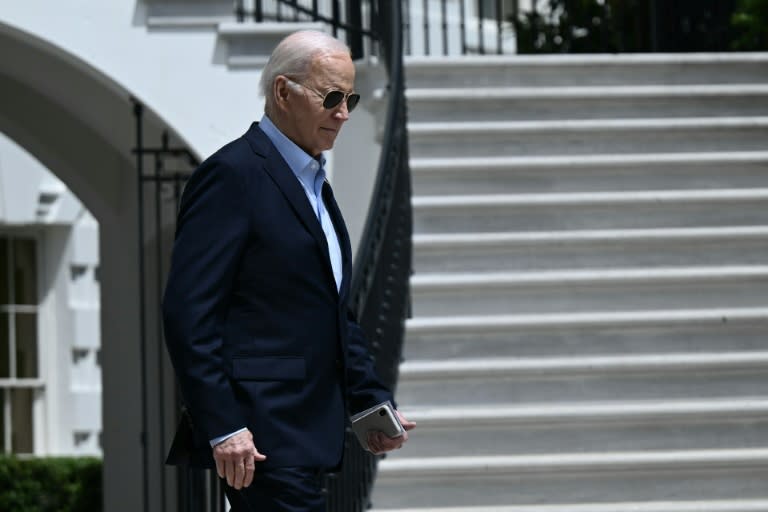As student protests shake US campuses, Biden mum

- Oops!Something went wrong.Please try again later.
- Oops!Something went wrong.Please try again later.
What does Joe Biden have to say about the rowdy student protests against Israel's war with Hamas in Gaza that have rocked American college campuses in recent weeks? Almost nothing.
The US president has so far avoided the contentious subject as it is likely to complicate his reelection campaign.
The 81-year-old Democrat, who will almost certainly face Republican Donald Trump in November's presidential election, has publicly addressed the demonstrations only once and briefly, even as students have clashed with police and several hundred people have been arrested at universities across the country.
"I condemn the anti-Semitic protests. That's why I have set up a program to deal with that," Biden said last week in response to a journalist's question. "I also condemn those who don't understand what's going on with the Palestinians."
Biden's reluctance to weigh in on the biggest and most prolonged unrest to rock US campuses since the Vietnam war protests of the 1960s and 70s has not gone unnoticed by Trump.
"There's a big fever in our country, and he's not talking," the 77-year-old tycoon said Wednesday during a campaign rally.
Trump urged college presidents to "remove the encampments immediately, vanquish the radicals and take back our campuses." As for the demonstrators at Columbia University, he called them "raging lunatics and Hamas sympathizers."
- Balancing act -
White House spokeswoman Karine Jean-Pierre on Wednesday condemned "a small percentage of students" who have been disruptive after a night of clashes and arrests on several campuses.
"Students have the right to feel safe. They have the right to learn... to do this without disruption. And they have a right to feel safe on campus," Jean-Pierre told reporters, adding: "We are going to be really forceful here and continue to underscore how anti-Semitism is hateful speech."
She also acknowledged the war in Gaza was "painful" and assured that Biden supported the right to peaceful protest.
The balancing act is not easy for Biden.
"The protests put Biden in a difficult spot because for his coalition of voters from 2020 he relied heavily on young people in addition to Muslims and Arab Americans," said Alex Keena, who teaches political science at Virginia Commonwealth University.
James Zogby, president of the Arab American Institute, said the White House is "apparently convinced that they'll weather this storm and still defeat Donald Trump in November."
He added: "This is a dangerous miscalculation."
Since the start of the war in Gaza, which was triggered by the unprecedented attack by Hamas on Israel on October 7, Biden has faced criticism for his unconditional support for Israel.
When Biden travels, he is often met by demonstrators chanting "Genocidal Joe" and demanding a ceasefire.
A Harvard University poll published last month showed Biden was more popular with Americans under 30 than his rival, with 45 percent of respondents intending to vote for Biden and 37 percent for Trump.
But the eight-point difference is much smaller compared to a similar poll four years ago, when Biden led by 23 points.
- 1968 -
Biden could still win back the hearts of some young voters, if a ceasefire agreement coupled with the release of hostages held in Gaza is reached between Hamas and Israel.
"If there is a ceasefire, that would be huge," said Keena. "That would go a long way in maybe ending some of these protests or getting some stability back."
Washington has been pushing for a ceasefire deal for weeks. US Secretary of State Antony Blinken, who was in Israel Wednesday on his seventh Middle East crisis tour since the war broke out, said "Hamas needs to say 'yes' and needs to get this done."
If the agreement falls through and campus unrest continues, that would cloud the Democratic National Convention in August in Chicago, where Biden will be officially nominated for president.
In 1968, police clashes with demonstrators protesting against the Vietnam war marred the Democratic National Convention in Chicago after President Lyndon Johnson decided not to run for re-election.
At the time, Biden, a law student and centrist, stayed away from the protests. In a book published in 2007, he describes seeing students occupying a building at his university and thinking "Look at these assholes."
aue/md/mlm

